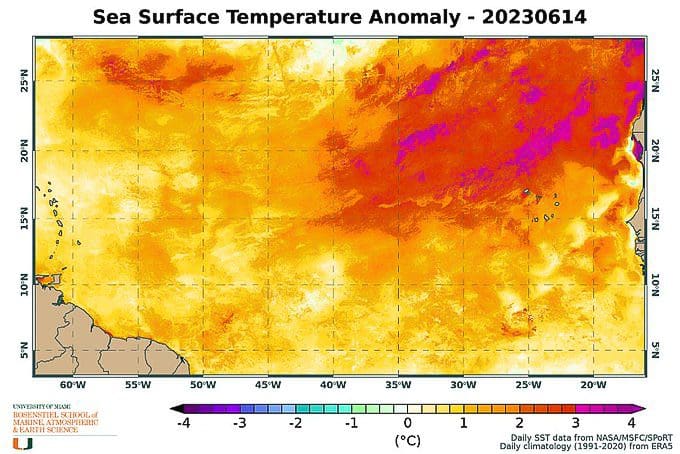You may be sweltering this June, but there’s another type of heat wave taking place far out in the Atlantic Ocean that’s baffling scientists. The surge is in sea surface temperature, and it’s been going on for months. On social media, instead of trading selfies, scientists are posting screenshots of ocean heat maps and wonky-looking charts and tables of thermal history.
They’re scratching their heads — with just a hint of alarm — about the rise in these measurements, known as “SSTs,” that have persisted since March. And there’s talk about how it might increase risk for the 2023 Atlantic hurricane season that has just started.
But there’s no agreement on the cause of the heat surge, or whether it’s a blip that will just fade out.
The Independent talked to two scientists at the University of Miami’s Rosenstiel School of Marine, Atmospheric, and Earth Sciences on Virginia Key to get a better idea of what’s going on.
“The average sea surface temperature in those places, whether it’s the North Atlantic or the world, is by far the highest it’s been in recorded history,” said Brian McNoldy, a meteorologist. The spike amounts to about one-half of a degree Celsius for a large swatch of the North Atlantic, he said.
“That’s an enormous region. And so to have half a degree, average above record, is just mind-boggling,” McNoldy said.
Closer to home, in the Caribbean and western Atlantic near the Bahamas, the sea surface temperatures are not as extreme.
Nick Shay, a professor of Ocean Sciences at Rosenstiel, said there are lots of theories about the increase, but no consensus.
“Maybe the circulation is slowing down in the ocean, allowing the SSTs to get warmer and warmer,” he said. Another possibility is that there is an overlap between normal oscillations in currents that take place over decades, that might this year coincidentally be “in sync” with the annual increase before hurricane season.
“I would not characterize it as astonishing,” Shay said, “I would say it’s definitely above normal, for sure.”
The larger concern, he said, if this year’s warmer waters were to become an annual feature.
“I certainly hope we don’t see this abnormally warm water every year, because eventually that would spell major disasters, particularly if we don’t have an El Niño or lots of shear in the atmosphere.” El Niño is a Pacific Ocean phenomenon that tends to suppress hurricane activity.
Closer to Florida, Shay said he’s been studying a buildup of heat in the Northwest Caribbean and a warm water eddy current can wind up turbocharging hurricanes.

“A lot of this is interconnected,” Shay said. “We just need more data to try to sort this out.”
McNoldy, the meteorologist, said that while a coincidence is possible, the anomalies in SSTs have been increasing, not decreasing.
“It’s possible that this is just some weird, short term blip. That still doesn’t make it less impressive.”
Invest in Local News for Your Town. Your Gift is tax-deductible
Tony Winton is the editor-in-chief of the Key Biscayne Independent and president of Miami Fourth Estate, Inc. He worked previously at The Associated Press for three decades winning multiple Edward R. Murrow awards. He was president of the News Media Guild, a journalism union, for 10 years. Born in Chicago, he is a graduate of Columbia University. His interests are photography and technology, sailing, cooking, and science fiction.



